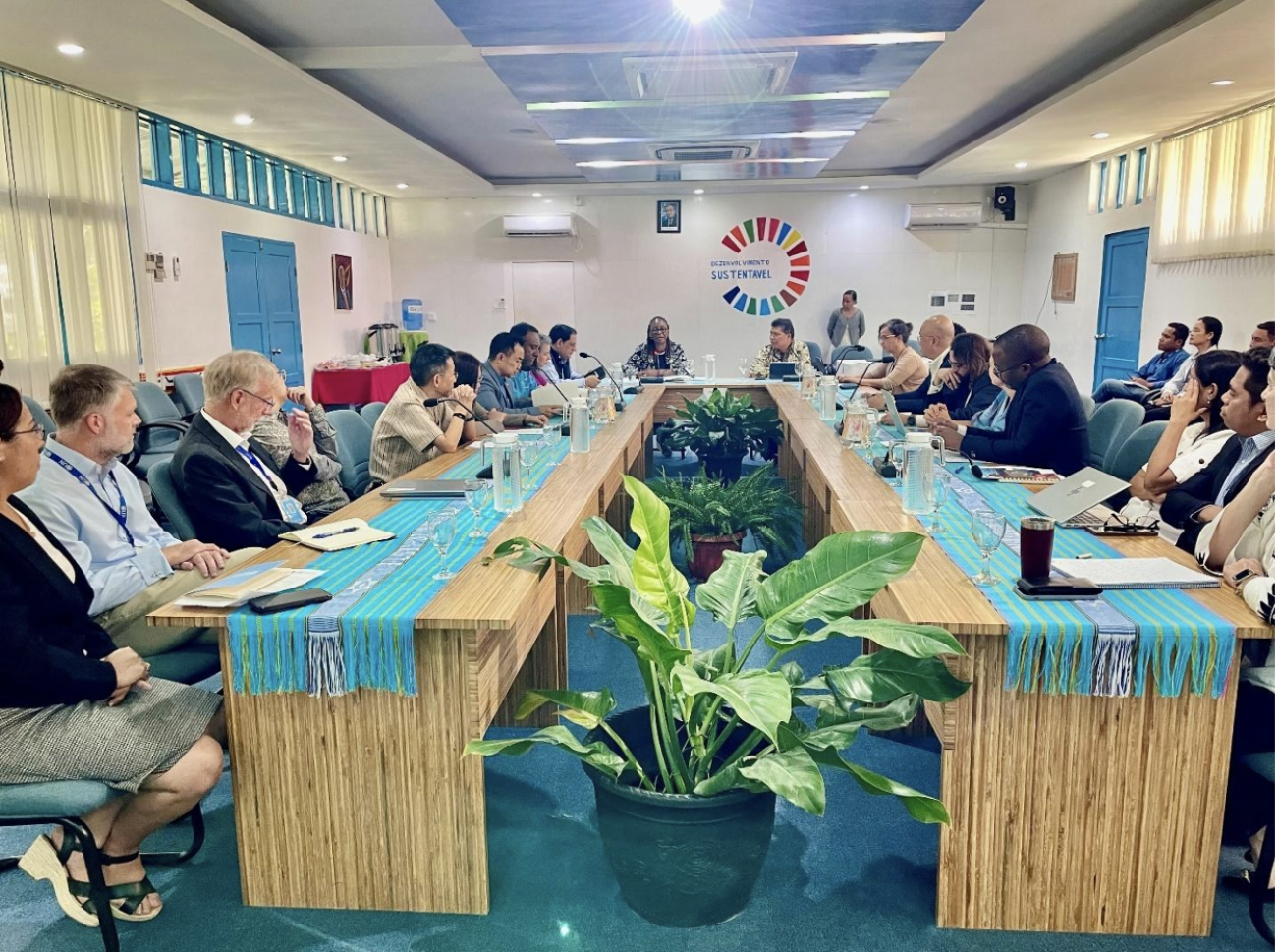Strengthening Partnerships: ASEAN-UN Country-Level Dialogue to Support Timor-Leste’s ASEAN Membership Aspirations

Strengthening Partnerships: ASEAN-UN Country-Level Dialogue to Support Timor-Leste’s ASEAN Membership Aspirations
In a significant step towards supporting Timor-Leste’s aspirations to join ASEAN, the United Nations in Timor-Leste is working closely with 6 of the 11 ASEAN embassies (Indonesia, Malaysia, Brunei, Thailand, the Philippines, and Singapore) present in the country. Together, they are providing coordinated and comprehensive support to align Timor-Leste’s national priorities with regional goals and standards. This partnership is rooted in the ASEAN-UN Comprehensive Partnership, formalised by the 2011 Joint Declaration and guided by the ASEAN-UN Plan of Action (2021-2025). This framework fosters collaboration across key areas, including peace and security, economic resilience, social inclusion, disaster resilience, and climate action—strategic priorities central to ASEAN’s Community Vision 2025 and the United Nations 2030 Agenda for Sustainable Development.
Following the 14th ASEAN-UN Summit on 11 October 2024 in Vientiane, Lao PDR, which called for strengthened country-level initiatives, the UN Country Team (UNCT) in Timor-Leste led by Resident Coordinator Funmi Balogun organised an ASEAN-UN Dialogue at the UN House in Dili. This session marked a critical step in supporting Timor-Leste’s ASEAN preparation, providing a platform for exploring collaborative opportunities that align ASEAN’s regional goals with the UN Sustainable Development Cooperation Framework (UNSDCF).
The dialogue aimed to advance active engagement and knowledge-sharing between ASEAN embassies and the UNCT, focusing on a singular goal: identifying ways ASEAN and the UN can jointly support Timor-Leste’s journey towards ASEAN membership.
“ASEAN member states are committed to supporting Timor-Leste's accession to ASEAN. We believe that Timor-Leste's membership will strengthen the unity and prosperity of the region,” stated H.E. Ambassador of Indonesia Mr Okto Dorinus Manik, Dean of ASEAN Ambassadors in Timor-Leste.
The dialogue was intended to facilitate knowledge exchange on shared interests, local challenges, and opportunities, identifying areas where ASEAN-UN collaboration at the country level could have the most impact, and have a deeper understanding of UN’s support to Timor-Leste in general.
The meeting focused on three critical areas where ASEAN-UN collaboration could drive meaningful progress for Timor-Leste;
Nutrition and Food Security: Presentations highlighted government-led efforts to combat malnutrition, strengthen food systems, and improve legislative frameworks, such as decree laws on breastmilk substitutes and food fortification. Advocacy efforts have led to increased school meal budgets, infrastructure investments, and the promotion of climate-smart agriculture. Community-driven initiatives, such as Mother Support Groups, have bolstered resilience and healthy behaviours amidst mounting climate pressures.
Healthcare System Strengthening: Discussions centred on enhancing primary healthcare, evidence-based systems, and behaviour change to improve health outcomes. Efforts included aligning healthcare strategies with ASEAN standards, bolstering digital tools for decision-making, and enhancing health financing mechanisms to build robust healthcare systems that meet ASEAN integration requirements.
ASEAN Accession Preparedness: The dialogue highlighted capacity building through training government officials in ASEAN standards and technical areas such as sanitary and phytosanitary (SPS) measures and technical barriers to trade (TBT). Legal harmonisation with ASEAN frameworks, robust monitoring systems, and private sector engagement were identified as vital steps for economic growth and regional integration.
This first dialogue set the stage for impactful ASEAN-UN collaboration, and the outcomes are expected to guide ongoing engagement, aligning Timor-Leste’s priorities with ASEAN’s goals and the Sustainable Development Goals, including the Pact for the Future recently signed by the Heads of States and Government at the Summit of the Future in September 2024.
An open discussion followed, recognising Timor-Leste’s progress over the past 25 years—from post-conflict recovery to becoming a stable nation. ASEAN ambassadors shared insights on potential collaboration areas, emphasising capacity building in human resource development, education, and legal harmonisation as critical pillars for successful ASEAN integration. Targeted, data-driven approaches, such as scholarships and specialised training programmes, were also highlighted.
Challenges, including coordination with local authorities and gaps in government capacity, were identified as areas for joint ASEAN-UN support. Climate resilience, economic diversification, and regional integration emerged as priority areas where collaborative efforts could have a significant impact.
“The United Nations remains steadfast in its commitment to supporting Timor-Leste’s development journey, ensuring the nation’s aspirations align seamlessly with regional and global objectives,” affirmed Funmi Balogun, UN Resident Coordinator in Timor-Leste.
Inclusivity was a recurring theme, reflecting ASEAN’s commitment to “leaving no one behind,” which aligns closely with the UN’s approach. Both organisations recognised the importance of prioritising women, youth, and marginalised communities to achieve inclusive progress for Timor-Leste.
The dialogue concluded with a joint commitment from the Dean of ASEAN Ambassadors, Ambassador of Indonesia H.E. Okto Dorinus Manik, and UN Resident Coordinator Ms Funmi Balogun to support Timor-Leste’s aspirations not just in its bid for full membership of ASEAN but in the achievement of the Sustainable Development Goals (SDGs).
The ASEAN ambassadors in Timor-Leste and the UNCT committed to convening regular dialogues, identifying opportunities to collaborate and leverage UN’s comparative technical expertise to continue to support h Timor-Leste's development priorities.
Produced by UN Resident Coordinator’s Office in Timor-Leste



